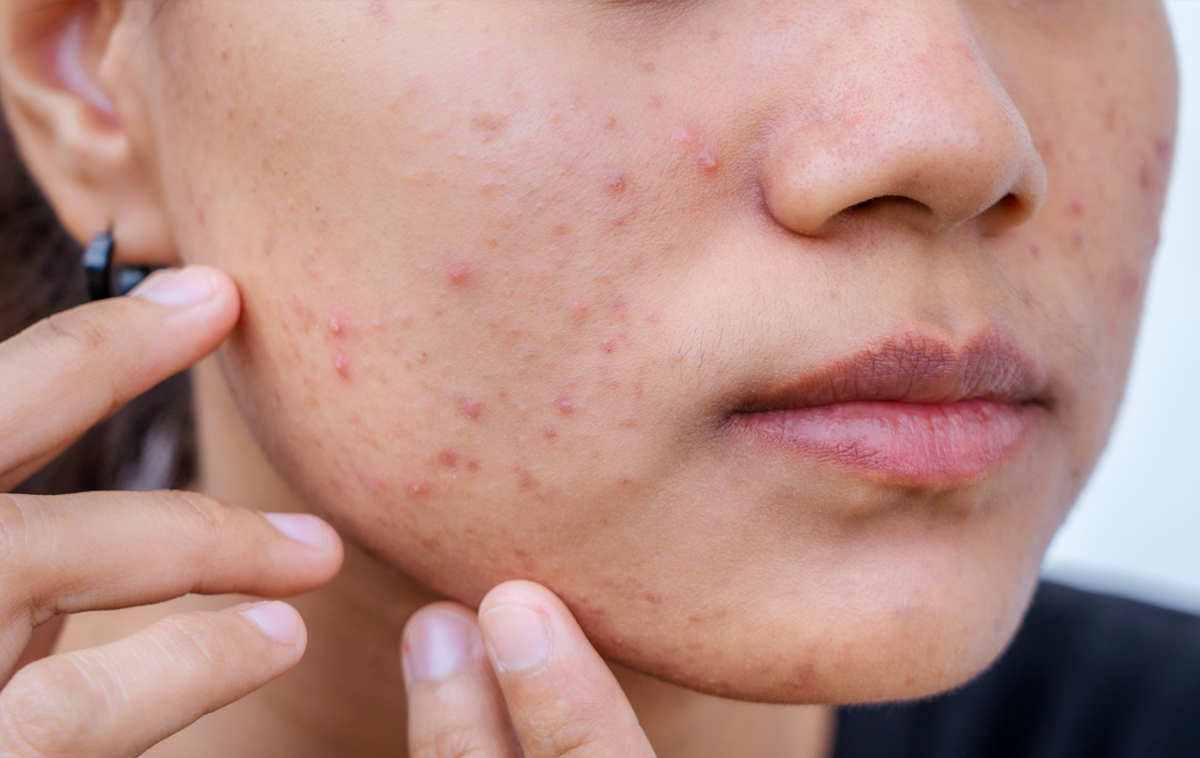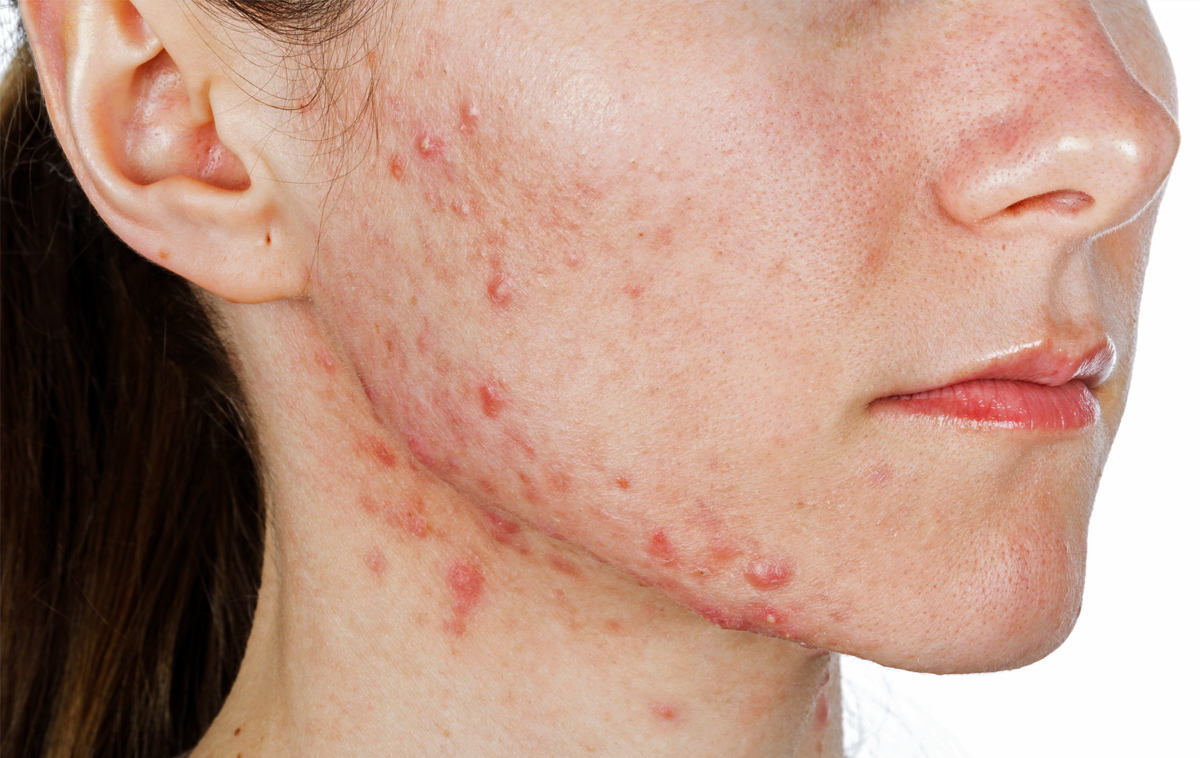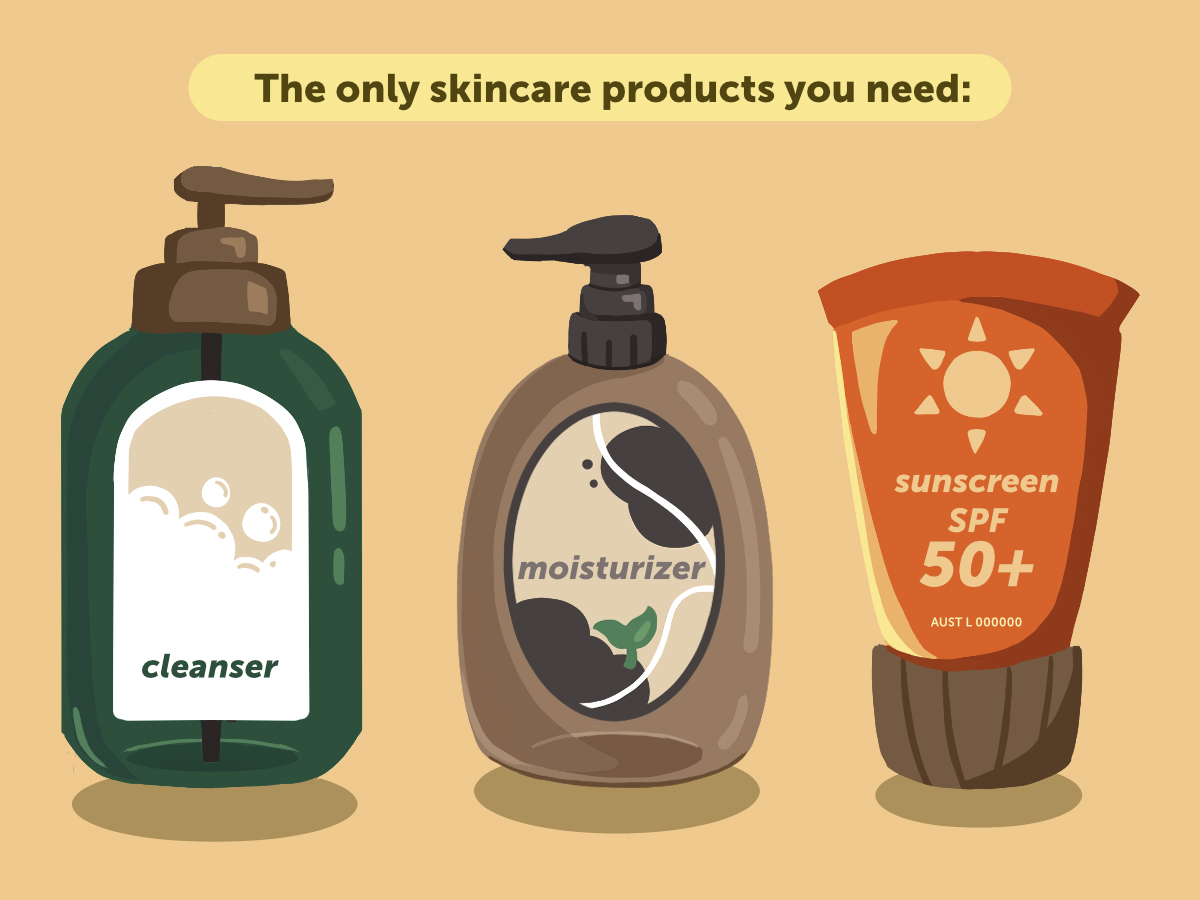At a glance
- Pimples are small skin bumps that happen when your pores (tiny holes) get blocked by oil or dead skin.
- If you get lots of pimples, you might have a common skin problem called acne.
- Pimples and acne are very common in teens; your diet doesn’t usually cause them.
- Acne isn’t a sign of dirtiness, and it doesn’t spread from person to person. It’s usually related to hormones and genetics.
- Keep your skincare simple. Most teens only need a basic routine of face washing, moisturiser, and sunscreen.
- Always put on sunscreen if the Ultraviolet (UV) Index Forecast is 3 or more, and wash it off at the end of the day.
- Don’t squeeze or pick your pimples; this can make them worse.
- If your acne isn’t going away, see your doctor for advice and treatments.
What are pimples, and what causes them?
Pimples are small bumps on your skin. They happen when tiny holes in the skin called ‘pores’ get blocked by oil or dead skin cells. You can get pimples anywhere on your body with oil glands, but the face, chest and back are the most common areas.
If you have lots of pimples, you might have a common skin condition called acne. Acne causes pimples and other blemishes on the face and body. Lots of people get acne at some point in their lives – usually when they are teens. It's not a sign of dirtiness,
and it doesn’t spread from person to person.
Why do teens get more pimples?
During puberty, your body starts making more hormones. These hormones grow your skin's oil glands. The larger glands can make more oil, which might block your pores and trap dead skin cells and bacteria. Your face, neck, chest and back are most likely
to get pimples because they have the most oil glands.
If dead skin cells and bacteria get stuck inside your pores, it can create:
- Inflammation = your body’s reaction to sickness or injury
- Whiteheads = small white bumps – often raised
- Blackheads = small, blocked pores that look like black spots
- Papules = small red bumps
- Pustules = small bumps filled with pus – often white or yellow in the middle
- Nodules = large, round bumps under the skin
- Cysts = large bumps filled with fluid and pus.

Figure one: Female teen with acne across her cheeks and jaw.
The occasional pimple or blackhead is not acne.
Acne can run in families. If your parents had acne, there is a higher chance that you will get acne.
Cystic acne
Cystic acne is a type of acne where the blemishes are often deep and painful. They might not have a white or yellow centre. Cystic acne is more likely to leave scars. If you think you might have cystic acne, see your local doctor (general practitioner
or ‘GP’).

Figure two: Female teen with cystic acne across her cheeks, jaw and neck.
The only skincare routine you need
It can be hard to tell which products are good for young skin – especially when skin care is promoted all over social media and in cosmetic stores. The truth is, you don't need to use many skin care products as a teen. Many trending ingredients are more
likely to irritate your skin than help it.
Most teens only need a simple routine with three products: cleanser, moisturiser and sunscreen. The key is washing your face twice a day, keeping your skin hydrated and protecting it from the sun. Unless your GP or a health worker suggests them, you don’t
need to use serums or other products.
Here is a simple skincare routine you can follow morning and night:
Morning
- Wash your face with water and a soap-free cleanser.
- Put on moisturiser.
- Apply an SPF50 (Sun Protection Factor 50) or higher sunscreen on days when the UV (ultraviolet) rating is 3 or above – usually from late spring and all through summer.
Night
- Wash your face with water and a soap-free cleanser.
- Put on moisturiser.
Simple, unscented skincare shouldn’t make acne worse. But if you do have oily, acne-prone skin, you might want to use either moisturiser or SPF (on days with a UV rating of 3 or above), instead of both.
If you want advice on the best products to help pimples and oily skin, speak to a pharmacist or your GP.

Figure three: Illustration of cleanser, moisturiser and sunscreen – the only three skin products most teens need.
Tips to help your skin health
Wash your face
- Try to wash your face in the morning, at night, and after any sports.
- It’s best to use water and a soap-free cleanser.
- Don't use hand soap to clean your face. It can wash away the natural oils your skin needs to stay healthy and hydrated.
Be gentle
- Scrubbing your skin can make it red and irritated.
- Use your fingers to apply a gentle cleanser to your face. Then, wash it off with water and gently pat your skin dry with a clean towel.
- Stay away from skin scrubs and peels; these can cause itching and redness, and make acne worse.
Choose makeup wisely and always take it off at night
- If you wear makeup, choose oil-free or matte-finish products so they won't clog your pores. These are sometimes labelled 'non-comedogenic' or 'non-acnegenic.'
- Taking off your makeup every day is important so your skin can breathe and your pores are clear.
- Use a soap-free cleanser or micellar water to remove your makeup. Makeup remover wipes often have alcohol and other harsh ingredients that can dry your skin.
Protect your skin from the sun
- UV or ultraviolet is a type of energy that the sun makes. The UV rating is higher in late spring and summer.
- The sun is very strong in Australia. It’s good to get some sun on your skin, but too much can cause damage and might lead to skin cancer later in life.
- You must protect your skin if the UV rating is 3 or above. Try to stay in the shade, put on a hat, and wear long clothing.
- Use sunscreen with SPF50 or above to block the sun from absorbing into your skin. The higher the SPF rating, the more sun protection.
Eat a balanced diet
- What you eat can affect your skin, but many skin problems are not directly caused by food.
- A balanced diet can help your skin stay healthy. There is no perfect diet to stop pimples, though.
- Try to eat more ‘whole foods’ – foods that haven’t changed from their natural state, like fresh fruits and vegetables – and less processed and fried foods, like chocolate and hot chips.
- You don't have to cut out treats; just consider them 'sometimes foods' as part of a balanced diet.
- Make sure you drink enough water each day – usually six to eight cups or 1.5 to 2L (litres).
- If you are sweating a lot because you are active or the weather is hot, you need to drink more water.
Avoid smoking and vaping
- You probably know smoking is bad for your health, but you might not know that it can harm your skin, too.
- Over time, smoking and vaping can dry out your skin, change its colour and cause early wrinkles.
- Smoking and vaping also reduce blood flow, which makes it harder for the body to heal pimples.
I have acne. What should I do?
There are lots of different treatments for acne. Start by following a simple skincare routine, drinking lots of water, and eating a balanced diet. If this is not helping, speak to a pharmacist or your GP about over-the-counter acne treatments for your
skin type.
Be careful choosing acne products, as some include harsh chemicals that might make your pimples worse. Just because something worked for a friend or influencer doesn’t mean it will work for you. Always follow the instructions and be patient – your skin
will take time to get better.
You can speak to your GP if you feel like you have tried everything to help your acne. They might suggest prescription treatments or refer you to a specialist skin doctor called a dermatologist.
If you often worry about your skin and body image or struggle with your mental health, you can speak to a trusted adult, your GP or another health worker, like a psychologist.
Things you might be wondering
Is it bad to squeeze pimples?
If you have pimples or acne, you should never squeeze or pick them, as hard as it can be to stop yourself. Squeezing and picking can lead to skin infections and create lasting scars, worse than the pimples and more permanent.
Is my diet causing my pimples?
Food alone doesn’t usually cause acne. But if you eat lots of processed foods and sugar, this might be making your pimples worse. Try some simple swaps to get more nutrition into your diet, like eating nuts instead of chips or fruit instead of
chocolate. A registered dietitian can give you personalised diet advice.
Should I use retinol on my skin?
You might have heard about retinol – a form of Vitamin A that can help with acne and aging skin. It’s in many skin products sold in shops (less strong) and with a prescription (stronger).
Retinol can cause skin flaking, redness, and even burns if it’s not used properly. Your skin is more sensitive as a teen, so you should be careful with products like retinol. It's best to avoid retinol unless a doctor recommends it to you and
explains how to use it.
What can doctors do for pimples?
Doctors can prescribe products and medicines to help clear up long-term acne. Your GP might start by prescribing a cream or lotion to put on pimples. If this doesn’t work, they might prescribe antibiotics (a tablet you take every day).
Your GP might refer you to a dermatologist if your acne still hasn’t gone away after antibiotics. They might suggest a medicine called isotretinoin. Isotretinoin is very good at clearing stubborn acne, but it does have some side effects. So, you
should talk to your doctor about isotretinoin before you start taking it.
Are there any natural remedies to help acne?
It’s best to speak with your GP or another health worker about natural remedies for acne before you try anything new. This is because some natural treatments can irritate your skin further or interact with other medicines you might take.
Helpful links
Developed by The Royal Children’s Hospital (RCH); medical review by the Adolescent Medicine department, with input from the Dermatology department. Created with advice from our Youth Advisory Committee.
Reviewed August 2025
Speak with a doctor for up-to-date and personalised medical advice.